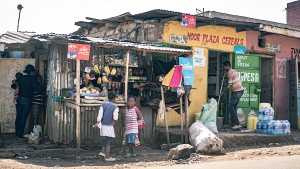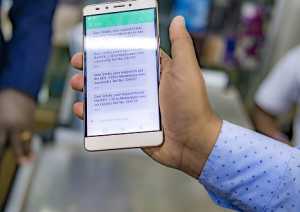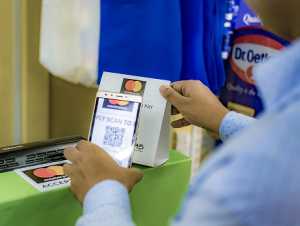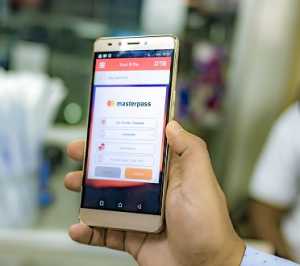Let’s face it, when it comes to payment methods, we’re spoiled. We can use credit cards, debit cards, digital wallets, or even good old fashioned cash (remember that?).
The rest of the world isn’t necessarily as lucky.
In many areas of Africa, a lot of people don’t have access to affordable credit. They pay for things with cash or using a debit-like system such as M-Pesa, through their telcos. With M-Pesa, users deposit money into a wallet stored on their cell phones and use PIN-secured SMS text messages to send and receive funds deposited via a network of agents. In Kenya, fully half of the GDP passes through mobile networks.
There’s a lot of money at stake. Africa’s economy is poised to hit US $3 trillion by 2030, according to Ernest & Young’s “Attractiveness Program Africa 2017” report, and today 95 percent of transactions with businesses of all sizes are conducted with cash.

However, there’s a big piece of the economy that’s invisible: the micro-merchants. They don’t have proper business records. They can’t afford transaction fees for other payment media, so deal only in cash, and most don’t have bank accounts or any credit rating. They purchase only as much stock as their cash on hand can stretch to, not as much as they could actually sell, so have difficulty expanding their businesses, and any disruption, such as illness, could be a disaster. In Kenya, this informal economy consists of over 100,000 small merchants.
Mastercard is trying to improve the situation through its Nairobi, Kenya-based Mastercard Labs for Financial Inclusion. Established in 2015 with the support of an $11 million grant over three years from the Bill and Melinda Gates Foundation, the lab works with partners and the community to build solutions such as its mobile marketplace app for farmers, 2KUZE (Swahili for “Let’s grow together”), which connects small farmers with agents and buyers of their crops. It works like this: an agent registers buyers and farmers. When a buyer posts an order on 2KUZE (say, asking for 500 pounds of coffee), it is relayed to the farmers by SMS, and those who have produce to sell, accept the order, stating how much they are offering – perhaps one farmer has 200 pounds, another 250, and a third 50. The agent collects the produce, delivers it to the buyer, and collects payment, then in turn pays the farmers via mobile money such as M-Pesa, bank transfer, or cash. Using the app creates a digital record of the transaction, giving the farmers, possibly for the first time, a digital business history that they can use to obtain financial services like loans or insurance.
Mastercard says that this sort of financial inclusion helps expand the middle class, generate equal opportunities, increase social engagement and economic mobility, and empower people. It also gives more visibility into the economy.
That’s of great interest to the government, since the invisible (and thus untrackable and untaxable) informal economy means that its tax base is only 10 – 15 percent of the population. In most developed countries, revenue collected by the government represents between 25 and 40 percent of the GDP; in Nigeria, in contrast, it’s only 6 percent.
Last December, Mastercard took a group of journalists to Nairobi to see how a pair of its initiatives, now in pilot, are affecting micro-merchants in the city.
These micro-merchants sell tiny volumes of merchandise – perhaps $20 per day – sometimes in fractions of a package. In some cases, people will apparently come, toothbrush in hand, to purchase a single squeeze of toothpaste before they head to work in the morning. Hours are long, with some merchants staying open from 5:30 or 6am until 11pm. And every moment that the merchant is not in his or her stall could be a moment when they lose a sale.

Yet they still have to acquire stock, and that’s where Kionect comes in. Kionect is a digital ordering system being tested by 1,000 businesses in three of Nairobi’s informal settlements. It’s the result of a partnership between wholesaler and distributor Kaskazi, Diamond Trust Bank (DTB), and Unilever, with the participation of micro-financing provider Musoni . With Kionect, merchants can send SMS orders to Kaskazi, receive acknowledgement, take delivery, and pay for their orders using a smartphone or feature phone. During the pilot, merchants can order Unilever products on credit (at first, only a few dollars, to be repaid within a few weeks), and Unilever will cover the merchant transaction fees. As they build a history of on-time repayment, the credit available increases. That lets the merchants grow their businesses.

Kaskazi agents deliver the orders and accept payment. Pre-Kionect, merchants didn’t know exactly what their orders from wholesalers would cost (opening the door to agent “markups”). Sometimes, they would have to refuse items because they didn’t have the cash to pay for them. With Kionect, the SMS order acknowledgement includes the pricing, and when the merchant accepts the order and pays the agent, often through M-Pesa, merchant, wholesaler, and agent receive acknowledgement on the spot. It not only makes life easier for merchant and wholesaler and creates that all-important digital business record, it eliminates any chance of fraud. Funds clear immediately.

The second initiative, Masterpass QR, is an alternative digital payment system. Think of it as a sort of debit card, with no limits other than the customer’s bank balance. It’s available via banks’ mobile banking apps.
We’re acquainted with QR codes as “pull” technology, usually used in advertising – we scan the code with our phones, and it points us to a website. That usage can be a security nightmare (you have no idea where the code is sending you; fraudsters could easily replace a legitimate code with a malicious one). After a flurry of experimentation, this model seems to have quietly faded away.

Masterpass QR inverts the function, turning it into a safer “push” technology. When the customer wants to pay for something, scanning the QR code into the banking app directs the bank to pay the merchant assigned that code. The customer enters the payment amount and a personal PIN to complete the transaction, which is then confirmed to both customer and merchant by SMS. Everyone knows immediately who’s paying, who’s getting paid, and the amount, with no risk of fraud.
One huge benefit of using Masterpass QR is the fact that the merchant doesn’t need a point of sale terminal of any sort to do so. All it takes is a phone. It’s more secure than cash as well; merchants don’t need to worry about being robbed of their money at the end of the day. And, most importantly for smaller merchants, the funds are transferred immediately. They don’t have to wait the day or so required by other non-cash payment methods. That means if they sell an item, the money is available to repurchase inventory that night if necessary.
There’s even a good chance, said Mastercard, that Masterpass QR will eventually migrate to our side of the world. Technically, it shouldn’t be too difficult to implement; Masterpass QR uses the same infrastructure used by the Masterpass payment system we use here.
These technologies, and others, are opening the doors to economic inclusion to even the humblest of businesspeople. A single mom in an open stall facing a dirt road in Nairobi suddenly has similar opportunities as those enjoyed by what we consider a more traditional business, such as access to financial tools like credit and insurance. And that can help her expand to make a better life for herself and her family.








